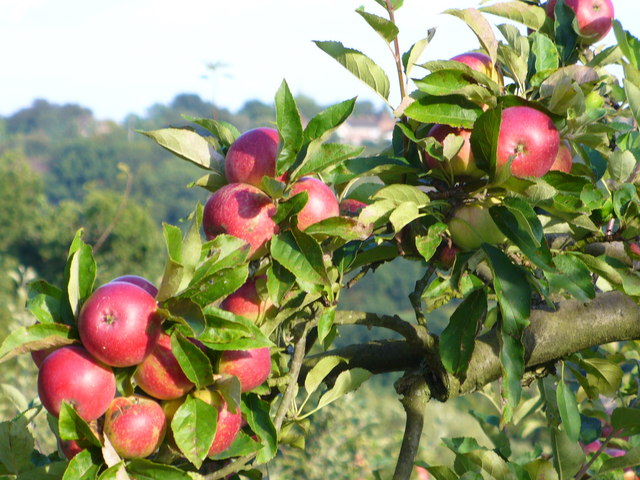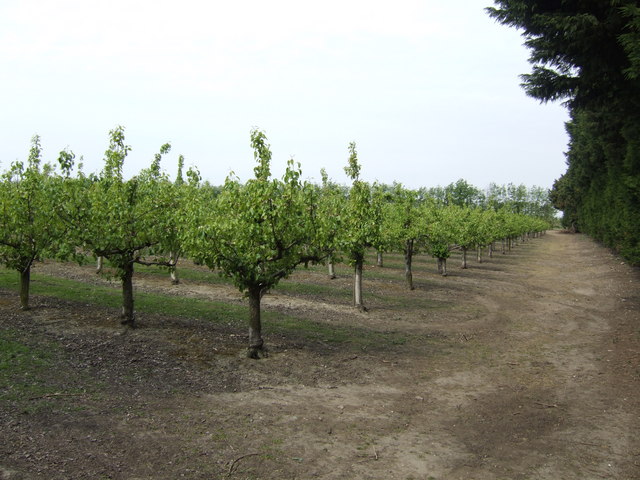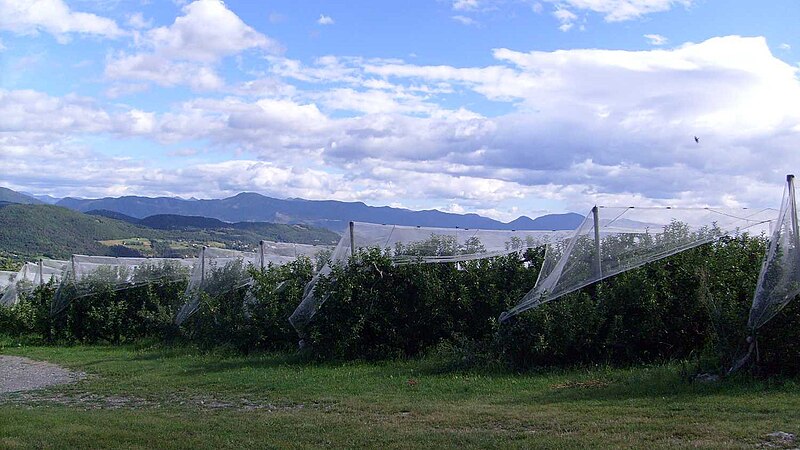 |
| By Colin Smith, CC BY-SA 2.0 |
I was lucky to write my dissertation for the MSc degree in Environmental Policy and Management on a topic that is crucial, needs thorough examination, and is of uttermost interest to me. The project explored the impact of extreme weather events on resilience of the fruit supply chain in the UK with a case study of the UK apple supply chain. This project was done under the dissertation partnership scheme and was proposed by the Department for Environment, Food and Rural Affairs (DEFRA).
This project drew on several other studies conducted in this field, indicating the need to assess the vulnerability of the UK food supply to climate change, and extreme weather in particular. The most recent project was performed by the Cranfield University on behalf of DEFRA and estimated the resilience of the UK wheat and potato supply chains towards extreme weather. Therefore, it was agreed that I would focus on another supply chain to contribute to the knowledge necessary for the development of adaptation strategies and delivering advice to industry.
The apple supply chain was chosen for the case study as apples are characterized by the largest UK home production among fruits grown in the UK. The main research objectives were:
- Explore key vulnerabilities of fruit production to extreme weather by conducting literature review.
- Investigate impacts of extreme weather on apple home production.
- Evaluate factors affecting resilience of imports and retail of apples.
- On the basis of the case study on apples, determine factors affecting supply chain resilience for other types of fruits.
- Formulate recommendations on enhancing general fruit supply resilience.
The literature review revealed several key vulnerabilities of fruit development: winter chilling (for apples, 1000-1500 cumulative chilling hours at a temperature lower than 7°C are required over winter for successful development of the fruit), spring frost, rainfall, pests and diseases. Resilience of the apple supply chain was studied using a case study as the research strategy. Interviews and questionnaires were selected as methods for data collection. Interviews were targeted at all-UK fruit growers’ organizations, major importing companies, several large farms, and UK supermarkets, which yielded altogether 17 interviews. In addition, self-administered questionnaires were targeted specifically at apple growers in the UK irrespective of the region. 20th Century Reanalysis (V2) data was used to assess the trend in winter chilling hours in the UK.
I was very curious about the project as I was feeling that my research could indeed contribute to the understanding of the influence of extreme weather on food security in the UK. It was an amazing experience to talk to farmers, fruit producers and their organisations to actually hear real stories on how climate change affects them and what can be done and what they do to adapt.
Responses from the questionnaires and interviews revealed that farmers have experienced impact of extreme weather, but it has not been detrimental to the apple growing industry so far. The conducted analysis of the winter chilling trend has revealed its current decline and indicated the same decreasing tendency for the future. Additionally, it showed that the period of the hours with the air temperature less than 7°C is becoming warmer. The breeding of low chill plant varieties (cultivars) is probably the most obvious solution to insufficient chilling, the other ones being defoliation and temperature treatments and chemical breaking. However, it is difficult to breed new cultivars, and this takes a long time.
The well-designed contingency plan, good relationship with suppliers and their diversification, as well as sound knowledge of apple growing seasons in different countries are considered to be the key factors making the apple supply chain resilient from the point of view of importers and supermarket representatives. A long shelf life and cheap transportation conditions add to the resilience. Although respondents acknowledged that they do encounter problems related to extreme weather events, they have always managed to tackle them and do not perceive them as threatening UK supply.
 |
| Pear orchard. By Jonathan Billinger, CC BY-SA 2.0 |
The same conclusions about the impact of extreme weather events refer to pears as they have the most similar vulnerabilities to apples in terms of extreme weather. Cherries are now increasingly grown under plastic covers, which implies that impact of hail and wind is less of a problem for them. Poly tunnel or glass protection is used for soft fruit except for blackcurrants that are grown in the field. However, protection is removed for winter, therefore, extreme rainfall and flooding and winter chilling still might be a problem. Winter chilling is projected to be more of an issue for apples, cherries, European plums, blackcurrants and raspberries, as these require a considerable amount of chilling hours (from 800 to 1500-1700).
Importers build their contingency plans for all types of fruits, and none of the respondents mentioned any problems with their supply. Given the favourable financial situation of the UK, these considerations may entail that no matter the potential impacts of the extreme weather in the UK in the future, the fruit supply chain will always be resilient for the end consumer. However, this situation is not encouraging for farmers as the predicted increase in extreme weather events will potentially mean losses in their production or even complete closure of their business. The option of moving production to the north to obtain more winter chilling does not feel feasible as orchards are very expensive and it takes several years to obtain the first yield. Moreover, there are apparent complications in terms of moving home and the whole business to another region. In order to prevent this, an increased knowledge transfer is needed between horticulture and climate scientists and individual farmers to help them prepare for extreme weather as well as enable to take the necessary measures. Financial support for purchasing advanced scab detecting and moisture sensing equipment, and taking hail insurance, might be needed.
 |
| Hail nets over apple trees, like these in France, may become more common in the UK as more extreme weather takes place. Image credit: Wikimedia Commons, Aups. |
The study concludes that in general the fruit supply chain in the UK is quite resilient for the end consumer, importing industry and retail, with growers potentially having more problems in terms of the impact of extreme weather on the crop in the future. In the first place, this might be caused by a decrease in winter chilling.
Despite the fact that in general the respondents were indicating the same set of problems, which was assuring for me, there was a clear tendency for academic staff in different universities I contacted and representatives of farmers’ unions to focus more on winter chilling in comparison to individual farmers. This might be explained by the difficulty in assessing changes in winter chilling without actually conducting analysis in this field. It is very interesting to know how climate change may impact food security by altering winter chilling patterns, which is not obvious, not easy to notice or track. At the same time, if measures for development of new low-chill cultivars are not taken now, a decline in apple production may appear unexpectedly.
Certainly, the study has its limitations. These included time constraints due to the fixed time frame for conducting an MSc dissertation (there is so much more to explore on the subject!), lack of accurate extreme weather predictions linked to uncertainty in climate models and inability to make accurate attributions of an extreme event to a change in apple production unless it is an obvious event which caused immediate damage (like hail, for example). However, despite these limitations, I hope that my research will help the UK Government deliver necessary advice to industry. I have always felt that the topic of my dissertation is important, and for me it was very rewarding to know that my work is really needed.
————————————-
This blog was written by Evgeniia Kostianaia, who studied an MSc in Environmental Policy and Management in 2014-2015 at the University of Bristol.
 |
| Evgeniia Kostianaia |
Find out more about the Cabot Institute supported Community Based Learning Projects at the University of Bristol or contact cabot-cbl@bristol.ac.uk if you would like a student to conduct a research project for your organisation.
